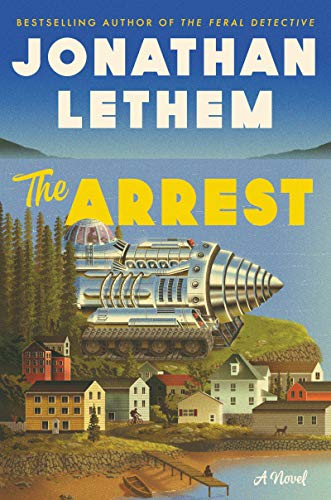In The Argus’ new series of book reviews, we are having students comment on titles that have yet to be released. “The Arrest” is available for pre-order online and will be released from Ecco on November 10, 2020. Here’s contributing writer Jillian Pincus on Jonathan Lethem’s latest novel:

What happens when technology fails, and cars stop operating? What about when phones no longer make calls?
Jonathan Lethem’s new novel “The Arrest” does not end the world as we know it. Rather, it takes our world and tells of its transition into a new phase of existence in which all technology has collapsed. Alexander Duplessis, nicknamed Sandman, Sandy, and, most often, Journeyman, was a television writer before the Arrest. Now, he lives in a community on a peninsula, along with his sister Mandy and her partner Astur. The community has no mayor or governing body, but instead exists as an agrarian society. Journeyman always feels slightly out of place, existing in-between different groups but never as a fully integrated member. Reality and fabrications become entangled as Journeyman tries to act as everyone’s intermediary, especially when someone from his past resurfaces in the community.
An author already well-known throughout the literary world for novels like “Motherless Brooklyn,” Lethem has an ability to fuse various genres into a style of his own. In “The Arrest,” he explores the human condition while mixing in elements of science fiction and the fantastical. Lethem’s writing is smart, funny, and ridiculously witty, qualities all evident in “The Arrest.” You’ll find yourself laughing, crying, loving, and frothing with anger, sometimes all at the same time.
“The Arrest” masterfully takes on that in-between point where the rational and irrational meet. Journeyman operates as a physical manifestation of that ambiguity. He serves as a literal go-between in his job as the community’s delivery person, and also as the middleman for different and, at times, diverging ideas and wishes within the community. As a result of his intermediary status, Journeyman feels isolated and fails to recognize that those around him feel just as isolated as he does. His confusion about other people’s thoughts and feelings throughout the novel mirrors that of the reader’s; you always feel as though the other characters are one step ahead of you and Journeyman. Lethem writes this novel from a third person perspective that is limited to Journeyman’s mind, causing the reader to understand things at the same pace as him.
One of this novel’s central conflicts revolves around the relationship between Journeyman and Peter Todbaum, the person he knew from before the Arrest. Todbaum and Journeyman were roommates in college who went on to work together as producer and writer respectively in the television world. Todbaum is a charismatic speaker who cannot be trusted. He rides into town in a supercar fueled by nuclear power, the first working piece of technology anyone has seen since the Arrest. Todbaum tells stories of the world outside of the peninsula, but it is difficult to separate truth from fiction in his tales. Todbaum revels in the power he garners by creating this ambiguity. Journeyman must act as the middleman between Todbaum and everyone else as he attempts to find the truth in Todbaum’s extraordinary stories.
This novel also wrestles with the ambiguity of blame. Todbaum is convinced that an unproduced dystopian movie idea he conceived with Journeyman and Mandy is responsible for the Arrest. This not only emphasizes Todbaum’s narcissistic nature, but also helps the reader understand Todbaum’s rationale for coming to the peninsula: to somehow right this wrong. Journeyman also grapples with issues surrounding blame; he feels responsible for Todbaum’s presence in the community, which also forces him to confront his culpability for a long ago horrific interaction between Mandy and Todbaum. At the same time, Journeyman wrestles with the knowledge that his talents as a storyteller are useless in this community.
Members of the peninsula’s community also struggle with a form of grief that psychologist Pauline Boss calls “ambiguous loss.” The Arrest permanently separates families and friends, since disparate groups can no longer contact each other using technology. This grief exists without closure, since the community members do not know if the people they love are dead or alive. At the same time, the grief is overwhelming—every single member of this community has lost someone. The shared losses serve to simultaneously unite and isolate individuals, which stresses the contradictory nature of grief. It is sharable, and yet, there is something cruelly singular about it.
Like Todbaum, Lethem seems to revel in the novel’s ambiguity. The line between myth and reality blurs constantly throughout the novel. Its elusive ending leaves you wanting more, abandoning you in the same intermediary place that Journeyman always inhabits. But it’s oddly satisfying. Even though you’re left behind by this world, you are never abandoned by Journeyman. He stays on the same footing as the reader throughout the novel, which grants him a powerful sense of relatability. That’s what makes this book so difficult to put down. Journeyman, true to his nickname, takes you on an adventure you won’t regret.
Jillian Pincus can be reached at jpincus@wesleyan.edu.



Leave a Reply